JLR is transforming automotive logistics with closed-loop seat foam recycling. Through partnerships and innovation, it is advancing a circular economy, cutting emissions, and securing sustainable supply chains for luxury vehicles.
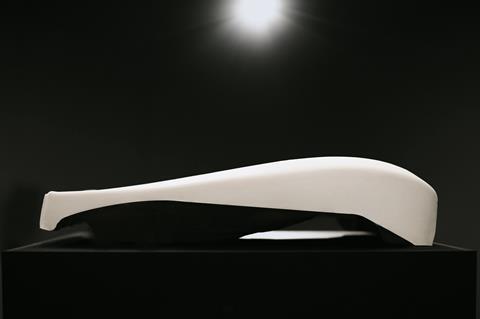
JLR has worked with fabric and seat suppliers Dow and Adient to produce a new seat foam for its luxury vehicles, made with closed-loop recycled polyurethane foam from seats in its used vehicles. The OEM said this is the first time closed-loop seat foam content has been successfully used in automotive production.
The solution aligns with JLR’s Reimagine strategy, an overarching vision to transform its operations and vehicles for a sustainable, all-electric future. In green manufacturing terms, seat foam recycling is a clear breakthrough, but its implications for logistics and supply chain management are even more far-reaching.
How JLR’s Circularity Lab led to sustainable seat foam through circular logistics
Seat foam, a complex and durable material, has long resisted traditional recycling efforts. Historically, its disposal has led to significant waste, with materials lingering in landfills for generations. JLR’s solution not only reduces waste but also secures a steady supply of low-carbon materials. This initiative enhances sustainability while addressing supply chain resilience—critical for an automotive brand (and a luxury one, at that), navigating the transition to electrification.
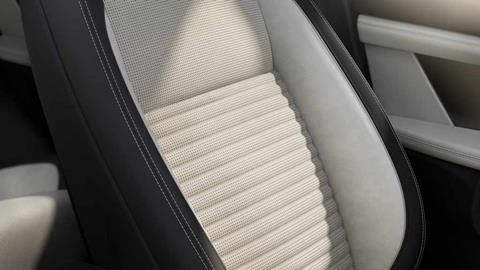
The company’s Circularity Lab in Gaydon lies at the heart of this effort. By dismantling end-of-life vehicles, JLR’s engineers, designers and sustainability experts gain critical insights into material recycling and reuse. This hands-on approach informs strategies that ensure materials, including polymers, glass, and metals, can be seamlessly reintegrated into production without compromising quality or performance.
Andrea Debbane, JLR’s chief sustainability officer, highlighted the strategic significance of JLR’s collaborative work on this solution, stating: “[This collaboration] represents a collective commitment to doing things differently, challenging us to rethink our approach from all angles to find the solutions needed to design and build the cars of the future.”
“By leveraging recycled polyurethane, we are setting new benchmarks for environmental responsibility while ensuring our products deliver the luxury and comfort our customers expect”
- Mick Flanagan, vice-president of the Customer Group at Adient
Partnering for logistics innovation
As mentioned, partnerships with Dow and Adient have been critical to scaling this breakthrough. Dow’s MobilityScience programme and its RENUVA initiative played an essential role in converting end-of-life materials into high-quality circular inputs. This collaboration supports JLR’s logistical goals of reducing dependence on virgin raw materials and aligning supply chain flows with sustainable practices.
Jon Penrice, mobility president at Dow, underscored this significance. “Through chemical and advanced recycling processes, this breakthrough depolymerisation closed-loop recycling solution meets the requirements and maintains the superior comfort and quality of JLR seats,” he said.
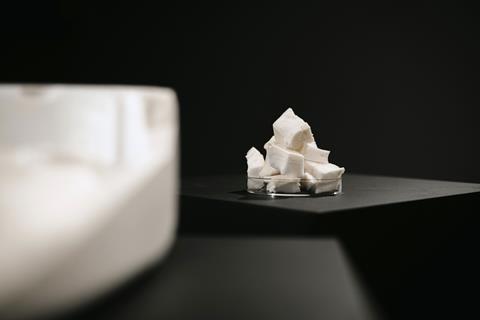
Adient’s role as a global leader in automotive seating further demonstrates the importance of supplier alignment in sustainable logistics. Mick Flanagan, vice-president of the Customer Group at Adient, noted: “By leveraging recycled polyurethane, we are setting new benchmarks for environmental responsibility while ensuring our products deliver the luxury and comfort our customers expect.”
Cutting emissions in logistics and supply chains
The environmental impact of JLR’s seat-foam innovation extends beyond its manufacturing operations. By integrating circular systems into its supply chain, JLR is reducing CO2 emissions significantly. For instance, JLR said the new seat foam reduces emissions by 44kg per seat, equivalent to the energy needed to charge 3,000 smartphones.
Other projects from the Circularity Lab include optimising polymer use in front bumpers, saving 177,500kg of CO2 and cutting costs by £560,000 ($709,400). These advances demonstrate how sustainable logistics can also yield operational efficiencies.
Additionally, JLR has established a closed-loop aluminium recycling programme. By recovering waste from body panel stamping and developing a new grade of aluminium tailored to this process, the company is reducing its environmental footprint while securing vital supply chain materials.
How Levent Yuksel, director of freight operations is helping JLR on its sustainability initiatives
JLR’s broader sustainability goals include a 46% reduction in CO2e emissions across Scope 1 and 2, and a 54% reduction across Scope 3 by 2030. So beyond the proximity of the first two scopes - which relate to direct emissions and energy usage, respectively - the OEM is undergoing a sweeping transformation to significantly cut its Scope 3 freight carbon emissions. Levent Yuksel, JLR’s freight operations director, has spoken about the importance of the OEM’s circularity approach, and the Circularity Lab is playing a key role.
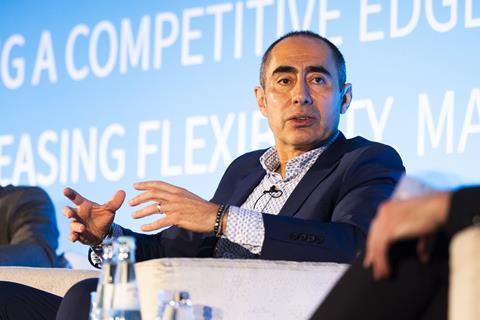
JLR’s Circularity Lab is set on identifying, and solving for regional and supply chain emissions, “hotspots”, creating actionable strategies for decarbonising logistics and material recycling. Yuksel previously pointed to this, saying, “we need to know where, how and what we emit. Then, where do these hotspots occur and how can we look at attacking and improving them.”
Read more: JLR’s strategic shift towards a carbon-free future
Seating foam is one of these hotspots. From a logistical standpoint, the sustainability ramifications for JLR’s new foam seating solution are extensive.
More JLR stories and videos
- Aligning logistics partnerships and ROI with sustainability
- Watch: Red Sofa interview with Mike Tickle, JLR, on supply chain transformation
- Watch: Red Sofa interview with Levent Yuksel, JLR on scaling green logistics solutions
Yuksel’s vision of intermodal logistics also aligns directly with these circular economy goals, leveraging diverse transport modes to cut emissions and optimise supply chains across the board. He previously told Automotive Logistics: “We want more intermodal activity, so we need to look at how many of the routes we can move to rail or inland waterways, and move to other alternative solutions.” The closed-loops seat foam system is just one of these solutions. Yuksel also recognises the iterative nature of such innovations, crucial for advancing such sustainability initiatives. “Every attempt is a learning curve,” he previously said, “and an experience, which we appreciate and value. There is always a learning in every failure and positivity behind every hardship.” This learning and positivity is equally applicable to JLR’s successes.
JLR’s Reimagine Strategy
JLR’s Reimagine strategy, introduced in February 2021, outlines the company’s vision to become a leader in modern luxury and sustainability. The strategy focuses on several key areas:
-
Sustainability: JLR is committed to achieving carbon net-zero status across its supply chain, products, and operations by 2039. The company has set a roadmap to reduce emissions across its operations and value chains by 2030 through approved, science-based targets.
-
Electrification: Central to Reimagine is the transition to an electric future. Jaguar plans to become an all-electric luxury brand by 2025, while Land Rover will introduce six pure electric variants in the next five years, with the first all-electric Land Rover model expected in 2024.
-
Operational Transformation: The strategy includes a comprehensive transformation of JLR’s operations, emphasizing efficiency and agility. This involves leveraging strategic collaborations and knowledge-sharing within the Tata Group to enhance sustainability and reduce emissions.
-
Investment in Technology and Innovation: JLR plans to invest significantly in electrification technologies, including the development of hydrogen fuel-cell technology, to prepare for future demand. The company is also focusing on developing connected services and data-centric technologies to enhance the customer experience.
-
Modern Luxury by Design: JLR aims to redefine luxury through distinctive design, innovative technology, and exceptional customer experiences, creating vehicles that are both desirable and environmentally responsible.
Expanding the circular economy in logistics
JLR’s growing leadership in closed-loop systems, as marked by its recent seat-foam solution, is complemented by its broader commitment to circular economy principles. As an Ellen MacArthur Foundation Network Partner, the company integrates these principles across operations, from refurbishing industrial equipment to optimising energy use. These efforts are vital as the carmaker transitions to all-electric production, where material sourcing and supply chain sustainability are under heightened scrutiny.
The closed-loop seat foam initiative, though technical in its execution, represents a strategic milestone for JLR’s supply chain, and showcases how logistics innovations can address sustainability challenges while enhancing operational resilience and efficiency.

























![Global[1]](https://d3n5uof8vony13.cloudfront.net/Pictures/web/a/d/s/global1_726550.svgz)




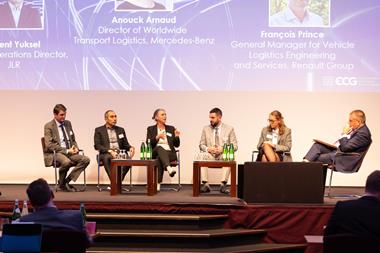


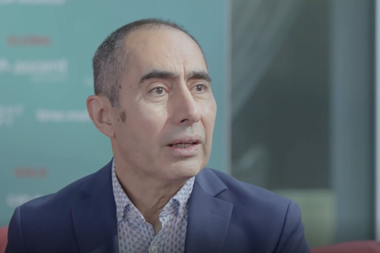
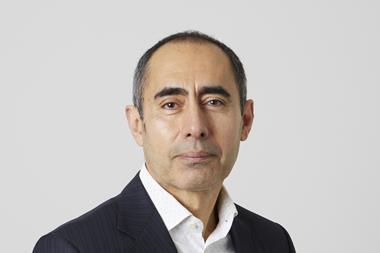




No comments yet